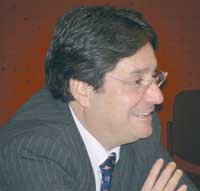Interview with Francisco Santos Calderón, Vice-President of Colombia
Francisco Santos Calderón joined the Government after a career of almost 20 years as a journalist for the influential newspaper El Tiempo, which his family owns. In 1990, he was kidnapped and held for eight months by the Medellín drug cartel. A decade later, a number of death threats from guerrillas forced him to go into exile for two years in Spain. As Vice-President, he focuses on defending human rights and combating corruption.
By Norha Restrepo
 They say "all's fair in love and war". In the Government's fight against drug trafficking and illegal armed groups from both the left and the right, what can be done to prevent excesses that might infringe human rights?
They say "all's fair in love and war". In the Government's fight against drug trafficking and illegal armed groups from both the left and the right, what can be done to prevent excesses that might infringe human rights?
I don't agree that "all's fair in love and war". It doesn't apply in either case, but especially not in war. This Government has made it very clear that its security policy will operate within the law. In Colombia these days you'll see soldiers of all ranks being tried and convicted by the civil courts for human rights abuses. Colombia has shown that it is a sound democracy, one that has survived despite violent threats from illegal groups financed by drug trafficking. These organizations are being defeated in Colombia, while we maintain total respect for democracy and human rights-and without the need for special counter-terrorism legislation-simply through good policing, political will, institutional controls and funding.
Thousands of people are kidnapped in Colombia, whether for political or economic reasons. You went through this yourself in 1990. If you were one of those being held captive, what would you expect from the Government?
The number of kidnaps in Colombia fell from 3,000 in 2002 to less than 500 in 2005. This means we're moving in the right direction. Five hundred is obviously a lot-100 is a lot-but, when we look at the dimensions of the problem, the action taken to combat kidnapping in Colombia is on a similar scale. As someone who has not only been a victim but has also established a foundation that has helped kidnap victims, I can only applaud the Government's efforts to combat crime and not to give in to terrorist blackmail. I think this is what society should expect from a Government that is giving people back their future and their sense of security.
Do you think a humanitarian exchange is possible at the moment?
It's not for lack of will on the Government's part that there hasn't been an exchange. The reason is the lack of will of the Revolutionary Armed Forces of Colombia (FARC), which are trying to make the Government and society submit to blackmail-a far from humanitarian approach. This group has kidnapped people and held them captive for four or five years. As Vice-President and as a kidnap victim, I obviously can't help but be sensitive to the pain of the families. But we also need to be mindful of future victims. If FARC had been willing to sit down and negotiate with the Colombian Government, these people would have been freed some time ago. The Government wants to get them out one way or another-we're still searching for them and we'll continue to search. If we find them, then the Government's intention is clear-it will, taking every precaution, attempt a rescue.
Corruption is another problem affecting developed and developing countries. What role do you think the United Nations Convention against Corruption can play?
These multilateral mechanisms are very important. The Inter-American Convention against Corruption of the Organization of American States has monitoring and evaluation mechanisms that have served us well. The United Nations Convention against Corruption also has very important mechanisms, but I think it lacks one thing: in the same way that the International Criminal Court deals with crimes against humanity, I'd like to see corruption offences-which are also crimes against humanity in many countries-incur much tougher penalties. It would help greatly if the European Union, the United States of America and other countries imposed severe penalties on companies that bribe public officials.
|
Seeking joint solutions to the cocaine problem: Shared Responsibility, an initiative led by the Government of Colombia, aims to get cocaine-producing and consuming countries to work together to find solutions to the global threat posed by cocaine production, trafficking and abuse. The initiative highlights the link that exists between cocaine consumption in Europe and North America and violence and environmental degradation in Colombia. In the words of Vice-President Santos Calderón: "We want European society to understand that it is helping to destroy the Amazon, that it is helping to kill people. Every line of cocaine that a European snorts is soaked in blood. It's not about trying to find someone to blame, but European countries could certainly do a lot more to combat cocaine consumption." Given that the cocaine trade cannot be dealt with exclusively from the point of view of either supply or demand, producer and consumer countries must share the responsibility. |
For more information visit the website